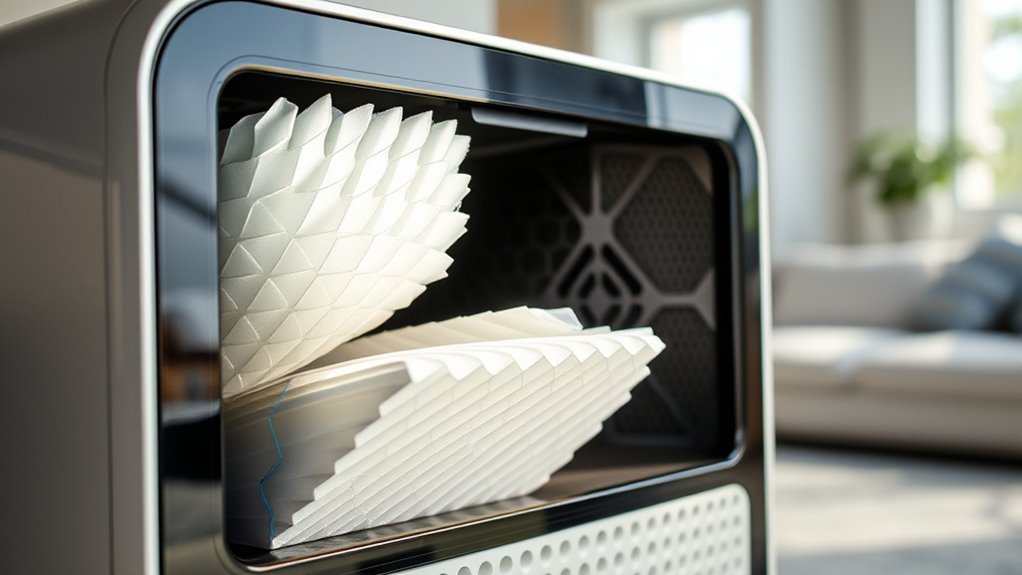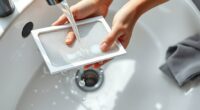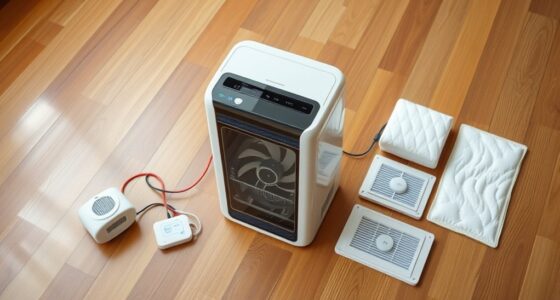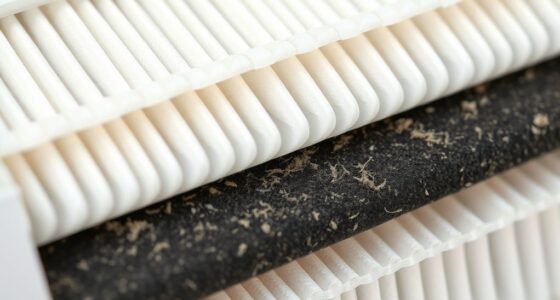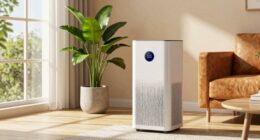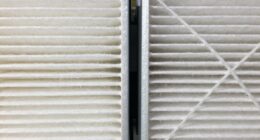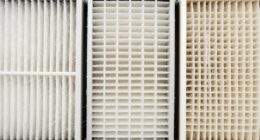To choose the right replacement filters for hybrid purifiers, consider their lifespan, compatibility, and quality. Opt for filters that suit your air quality needs and fit your device properly. Higher-quality filters last longer and maintain performance better, saving you money over time. Regular maintenance is key to prolonging your purifier’s effectiveness. Keep these factors in mind, and you’ll find the best filter options to keep your air clean and healthy—more tips are just ahead.
Key Takeaways
- Verify filter compatibility with your specific hybrid purifier model to ensure proper fit and function.
- Consider filter lifespan and replacement intervals to balance maintenance costs and air quality needs.
- Prioritize high-quality filters like HEPA for effective removal of dust and allergens, ensuring longer durability.
- Assess the overall cost per use, including purchase price and replacement frequency, for better value.
- Follow manufacturer recommendations for maintenance and replacement procedures to optimize purifier performance.
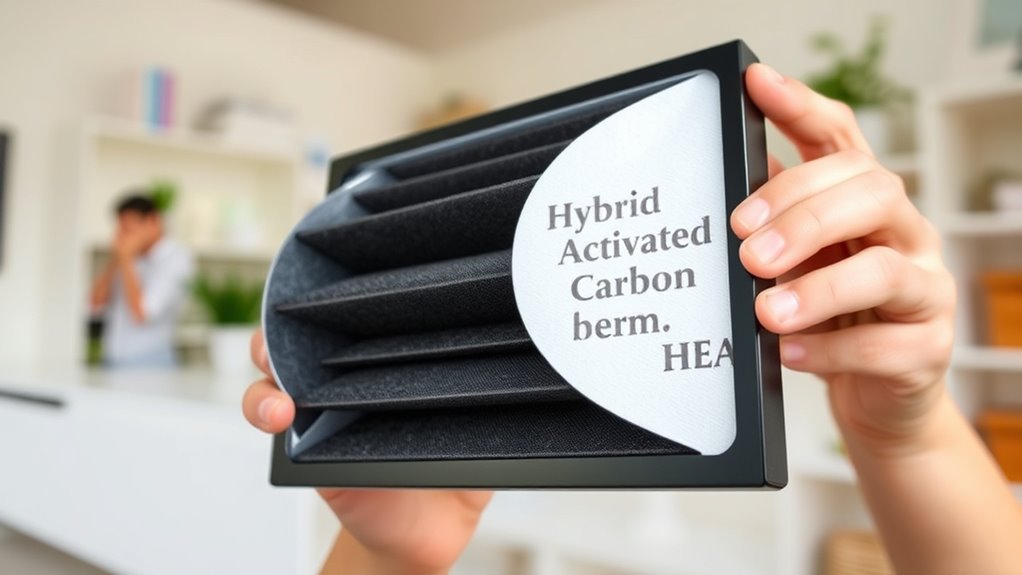
When it’s time to replace the filters in your hybrid purifier, choosing the right ones guarantees best performance and clean air. One of the most important factors to consider is the filter lifespan. Different filters have varying durability; some need replacing every three months, while others may last up to a year. Knowing the typical lifespan helps you plan replacements and avoid gaps in air quality. For example, HEPA filters generally last longer than pre-filters, but their performance can decline if not replaced on schedule. Regularly checking your filter’s lifespan ensures your purifier continues to operate effectively, trapping dust, allergens, and pollutants without compromise. Additionally, understanding the importance of proper maintenance can extend the efficiency and longevity of your purifier, preventing unnecessary costs and ensuring consistently clean air. Cost considerations also play a significant role in selecting replacement filters. While it might be tempting to opt for the cheapest option, cheaper filters often have a shorter lifespan and may not perform as well. This can lead to more frequent replacements, ultimately increasing your costs over time. On the other hand, investing in higher-quality filters might seem more expensive initially but can save you money in the long run by lasting longer and maintaining optimal performance. It’s worth comparing the price per use, rather than just the upfront cost, to determine the best value. Keep in mind that some filters are marketed as compatible or generic, which can be more affordable but might not meet the same standards as original manufacturer filters. Always verify the compatibility and quality before purchasing, to ensure you’re getting a filter that provides the best balance of cost and performance.
Additionally, consider the overall maintenance costs associated with each filter type. Some filters require specialized replacement procedures or additional accessories, which can add to your expenses. Also, think about the frequency of replacements—if a filter needs changing every month, it might not be cost-effective in the long run compared to a filter that lasts six months or more. Balancing filter lifespan with cost considerations means finding a filter that delivers consistent performance without breaking the bank. Remember, investing in a quality filter with an appropriate lifespan can prevent unnecessary wear on your purifier’s motor or other components caused by clogged or inefficient filters.
Ultimately, choosing the right replacement filters involves evaluating both how long they will last and how much they will cost over time. Pay attention to product specifications, read reviews, and compare prices to make informed decisions. Properly maintaining your hybrid purifier with suitable filters ensures you enjoy clean, healthy air while managing your expenses wisely.
Frequently Asked Questions
How Often Should I Replace Filters in Hybrid Purifiers?
You should replace the filters in your hybrid purifier every 6 to 12 months, depending on the filter lifespan and usage. Regular replacement guarantees peak performance and air quality. Check the manufacturer’s recommendations for your specific model, as some filters may need more frequent changes, especially if you use the purifier heavily or have allergies. Keeping up with the replacement frequency helps maintain clean, fresh air in your space.
Are Compatible Filters Available From Third-Party Brands?
You’ll be amazed at how many third-party filters are available, making it easy to find compatible options for your hybrid purifier. Just remember, third-party compatibility often means better price options, but always check for filter authenticity to avoid subpar performance. Some brands guarantee the same quality as original filters, so you can confidently choose trusted third-party options without sacrificing your purifier’s efficiency.
Can I Mix Different Brands of Filters in My Purifier?
You shouldn’t mix different brands of filters in your purifier because of brand compatibility issues. Using filters from different brands can affect the purifier’s performance and may even damage the unit. Always stick to the manufacturer’s recommended filters to guarantee the best operation. If you’re considering filter mixing, check your purifier’s guidelines or consult the manufacturer to avoid potential problems and maintain air quality effectively.
What Are the Signs That Filters Need Immediate Replacement?
Did you know that over 80% of households miss filter replacement signs? You should replace your filters immediately if you notice discoloration or decreased airflow. Discolored filters indicate trapped pollutants, while reduced airflow means your purifier struggles to clean the air effectively. Ignoring these signs can lead to poor air quality and health issues. Regularly check your filters, and replace them promptly to guarantee peak performance and clean, fresh air.
How Do Filter Replacements Affect Purifier Warranty?
Filter replacements can impact your purifier’s warranty if not done properly or within the recommended timeframe. Ignoring the filter warranty guidelines may void your warranty, leaving you responsible for repairs. Regularly replacing filters ensures maximum performance and preserves your warranty coverage. Always follow the manufacturer’s instructions for replacements to avoid any negative impact on your purifier’s warranty, and keep records of your maintenance for proof if needed.
Conclusion
Now that you know how to select the right replacement filters for your hybrid purifier, are you ready to breathe easier? Regularly changing your filters guarantees peak performance and cleaner air in your home. Don’t wait until your purifier’s efficiency drops—stay proactive and enjoy fresher, healthier air every day. After all, isn’t your well-being worth a little effort? Keep your purifier in top shape and breathe confidently knowing you’ve made the right choice.
